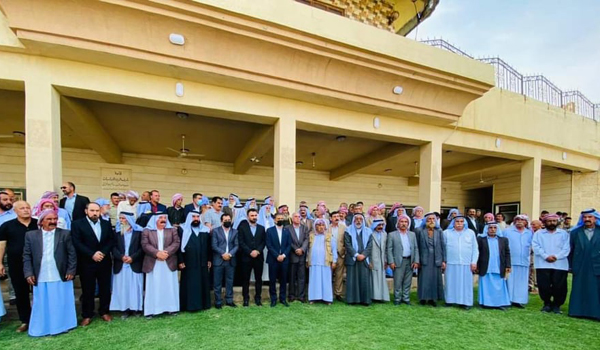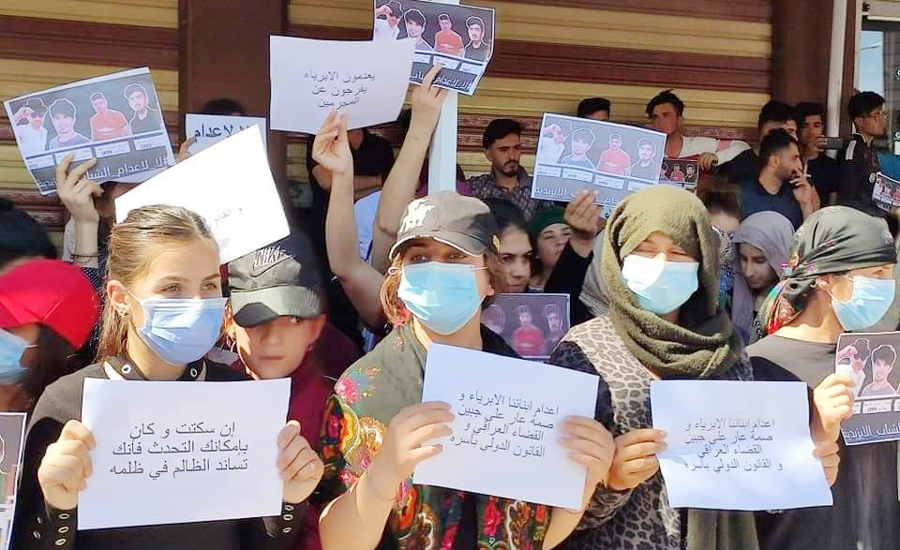Nineveh Criminal Court says the four Ezidi students are convicted of murder based on their statements and charged to face death penalty, a charge rejected by the Ezidi community who claim the youngsters were interrogated under pressure and push for fair appeal.
The four Ezidis said in the interrogation they took revenge from people whom abducted and murdered Ezidi girls. The court sent out the verdict on April 21 for murder of two young Arab locals from al-Shummar tribe on the highway of Giruzer-Shingal, west of Nineveh, on September 23, 2020.
The four convicted, Ahmed Faris 19, Khdir Sa'do 20, Faruq Faisal Hama & Sha'lan Alyass Qasim 22, were arrested on the same day of the murder.
Alyass Qasim, father of one of the convicted, said the day of the murder his son went to a picnic with his friends in home dress. He recalls waiting for him to return till late in the evening but the son did not make it home and his phone was switched off. Later relatives of his friends they were all arrested by the security forces.
They were transferred to al-Ba'aj district west of Nineveh.
"They were forced to sign a testimony as confession and sent to court. There was interference in court process."
Qasim says they have no weapons home. Besides, the place of the murder is close several checkpoints and military bases. "How easily these two young people were killed in such a location. I am determined my son is innocent."
"I believe it was carried out by Daesh militants to instigate feud between Ezidis and Shummar tribe in the region."
The father sobs the destiny of his son he has not met since the last day he departed home. "I believe it was carried out by Daesh militants to instigate feud between Ezidis and Shummar tribe in the region."

Shingal April 25th- Key political figures, tribe chieftains and clerics of Ezidi community gathered to protest court ruling. Photo by KirkukNow.
The court verdict generated widespread protests in Shingal and Ezidi inhabited towns. On April 25th, Key political figures, tribe chieftains and clerics of Ezidi community gathered at Sharafadin holy shrine in Shingal to protest court ruling and sent out a letter to Iraqi ministry of justice and Nineveh High court for the case of the four Ezidi youngsters.
Haidar Shasho, a Peshmerga (Kurdish fighter) commander and member of Ezidi Council told Kirkuknow following the meeting "what has been done is unfair to Ezidis. We support empowering law but the verdict should be fair and just and reject any intervention in the case."
"We ask for appeal to revoke the penalty. Such a penalty will lead to a bigger problem," Shasho threatened.
Ezidis are adherents of one of the ancient monotheist religions. Their population was over half a million in Nineveh province ahead of the so-called Islamic state ISIS invaded the region in August 2014, killing thousands of Ezidis whom the extremist Sunni Arab fighters accuse of being "devil worshippers."
Shingal, located 120 west of Mosul, center of Nineveh province, used to be home to over 100,000 Ezidi ethno-religious minority and one of the disputed territories between Baghdad and Erbil. Ezidis also live in Bashiqa and other areas in Duhok Northern Province.
Seized in August 2014 by ISIS militants whom accused the Ezidis of being “devil worshippers,” Shingal has been the scene of tragedy: a genocidal campaign of killings, rape, abductions and enslavement, and the surviving community fled to safer-heaven IDP camps in the adjacent northern Kurdistan region.
Ezidis accuse some of their Sunni Arab neighbors of sympathy for and collaboration with ISIS while the vulnerable community was being genocided at the hands of the extremist Jihadists.
KRG figures show that IS militants captured 6417 Ezidis mainly women and children out of which almost 3,000 are still missing. Over 8o mass graves and tens of individual graves were found and so far small part of it has been exhumed.
Following ISIS invasion, over 300,000 Ezidis were displaced to Mount Shingal and IDP camps in Kurdistan while about 100,000 has fled the country forever.
Though Ezidi inhabited region was retaken in 2015 by Iraqi and Kurdish forces IS invasion of the region and the fight against it led to vast destruction that requires tens of billions. The reconstruction process is very slow due to absence of funding: lack of security, stability, poor infrastructure and unemployment makes it hard for the vulnerable community to return home.
The catastrophe has led to daily casualties in the war-torn region as no serious were spent to save the traumatized survivors of atrocities. Several cases of suicide were reported amount the Ezidi youngsters in the last few days.
Ezidi leaders are working hard to save lives as the shocked and shaking community is not ready to receive any more blows.
Deputy Mir, prince, of the Ezidis has paid regular visits to Nineveh criminal court to push for fair verdict that satisfies both parties.
Jawhar Ali Beg, deputy of Ezidi Mir, said he is following the case since last January. Ali beg explained to the judges to avoid widening the gap between Ezidis and Shummar Sunni Arab tribe.
"Some of the judges promised a minor ruling but unfortunately some parties opposing the Ezdis pushed the court hard for a death penalty."
"Some of the judges promised a minor ruling but unfortunately some parties opposing the Ezdis pushed the court hard for a death penalty."
The court insists that the suspects confessed the crime.
Mohammed Aziz, chief administrator at Nineveh Criminal Court said the four young people confessed everything in front of the judge. "I see no mistake in the court ruling."
Aziz narrates the story of the convicted how they made a patrol in Um Ziban between GirUzer and Shingal and killed two Arab locals. In response to the judge about the reason, Aziz says they told the judge they "wanted to take revenge of Arabs especially those who enslaved and murdered our girls."
they told the judge they "wanted to take revenge of Arabs especially those who enslaved and murdered our girls."
Preparation and planning for the act and making a group are the bases for the verdict by the judge, he added.
Lawyers hired by the Ezidi families denied to comment on the case for KirkukNow yet only confirmed they are to appeal the ruling.
Khidir Salih, authorized by the four families to talk to media and coordinate with the lawyers, said they asked the lawyers not to comment on the case for their safety.
"We have three lawyers following the case but one of them was threatened by some parties so for their safety we asked them not to talk about the case," Salih said.
Salih said the lawyers told him when the judge asked the four detainees why they committed the crime, they denied the charges. When the judge said their files sent from Ba'aj court contains their confessions, they all said they were under pressure and threat gave statement and signed it.
When the judge said their files sent from Ba'aj court contains their confessions, they all said they gave statement and signed it under pressure and threat
Salih said they are determined to appeal the case at the earliest.
Since the military defeat of IS, discord over administrative and security arrangements, public services, and the lack of a unified administration, have plagued victims and survivors. Shingal has more than administrations, each affiliated to one of the leading groups whom deployed militant groups in the war-torn region.





